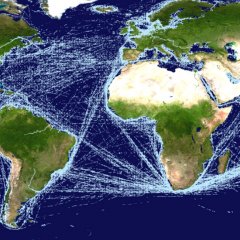World Ocean Radio - Trade and Transportation

Apprenticing has long been thought of as a term to describe someone working beside a master craftsperson to learn a trade and to refine a professional skill: whether it be pottery or electrical, cabinetry or plumbing. As an educational model it has long been mostly lost or forgotten, except in a place in midcoast Maine: The Apprenticeshop, where apprentices are learning the craft of building and restoring small traditional wooden boats and associated seamanship, in what can be argued as a most effective way of learning and living in a time when education is challenged by convention and complexity.
This week marks the 750th episode of World Ocean Radio: 15 years of weekly short audio that reaches millions around the globe, sharing concepts, demands, and solutions related to ocean technology and science, policy, examples of best practice, personal reflections, and solutions for how the ocean connects, sustains, inspires, and engages us in common history, traditions, sustenance, communication, community, and well-being. Thank you for listening!
What are the five key reasons for ocean conservation? What are the five areas where progress matters most? With the world in an off-axis state of turmoil, W2O founder Peter Neill is taking stock this week, asking the questions and distilling the essential reasons why the ocean is central to human survival.
The maritime industry is a major contributor to our global systems: our economies, security, and stability. More than 80% of all international trade and transport moves across the ocean: shipbuilding, port operations, shipping, cruise lines, offshore energy, pipelines, salvage, communications, cables, insurance, ferries, exploration and science. This week we are discussing a 2023 United Nations review of maritime transport, and the technologies that rely on the men and women worldwide who work in the maritime industry.
On the heels of the Arctic Circle Conference in Reykjavik, Iceland in October, World Ocean Radio host Peter Neill offers some additional thoughts on a changing Arctic and China's role in the future of the polar north. In this episode of World Ocean Radio we detail the intentions of the Chinese as outlined in a policy statement published earlier this year. And we discuss the likelihood that eastern powers such as China will have increased vested interest in trade, governance and finance--a blue economic passage to the potential wealth of resources in a changing, melting north.
The first Arctic highway was the sea: a moving, shifting, frozen system that allowed its inhabitants to be sustained for generations. Since 1974, two more roads have been carved from the Arctic landscape: the first to connect oil fields in the north to consumers in the south and the second, opened this year, to connect Inuvik to Tuktoyaktuk. This second project, more of a local endeavor, links the land's indigenous peoples to economic opportunity and affordable goods and resources. This week on World Ocean Radio we talk about these three roads and their impacts on the Arctic, for better and for worse.
The first Arctic highway was the sea: a moving, shifting system that allowed its inhabitants to be sustained for generations. Since 1974, two more roads have been carved from the Arctic landscape: the first to connect oil fields in the north to consumers in the south; and the second, opened this year, to connect Inuvik to Tuktoyaktuk. This second project, more of a local endeavor, links the land's indigenous peoples to economic opportunity and affordable goods and resources. This week we talk about these three roads and their impacts on the Arctic, for better and for worse.
Seaports have long been places of commerce and trade: hubs connecting land and sea in an import/export exchange that contributes to regional, national, and global economies. In this episode of World Ocean Radio, host Peter Neill discusses the history of the port of Gaza on the Mediterranean Sea, the long-standing Israel-Palestine conflict, and recent interest in a project to build an artificial island off the coast for the purposes of creating a modern seaport which could possibly break through the political paralysis of the region, create employment opportunities, and enable an import/export revival.
The 12-nation Trans-Pacific Partnership has been causing conflict of late, with a broad range of disagreements over key provisions and debates intensifying due to lack of information available to the public. In this episode of World Ocean Radio, host Peter Neill will discuss climate and environment as it relates to the agreement, and will cite from a draft analysis on environmental issues recently published in the New York Law Journal by Stephen L. Kass which provides interesting insight into the prospective terms of the proposed agreement.

